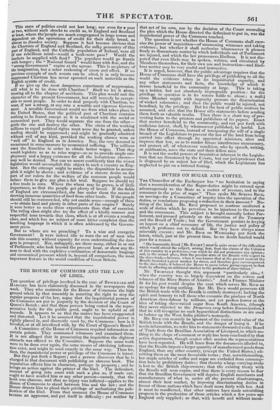THE HOUSE OF COMMONS AND THE LAW OF LIBEL.
Tim question of privilege involved in the case of STOCKDALE and HANSARD has been elaborately discussed in the newspapers this week. They who maintain for the House of Commons the high ground taken by that assembly in asserting the right to stop the regular progress of the law, argue that the inquisitorial powers of the Commons are put in jeopardy by the decision of the Court of Queen's Bench ; and that those powers being vested in the repre- sentative body for the public good, ought to be upheld at all hazards. It appears to us that the matter has been exaggerated and distorted. Let it be assumed that the inquisitorial power is rightly placed in, and discreetly used by, the Commons : how is it invaded, or at all interfered with, by the Court of Queen's Bench ?
A Committee of the House of Commons required information on certain points. They summoned witnesses and examined them. It is not alleged that in prosecuting the inquisition the slightest obstacle was offered to the Committee. Suppose the same work were to be done over again, the same means of obtaining informa- tion exist, and might be used exactly in the same way. Thus far, then, the inquisitorial power or privilege of the Commons is intact.
But they put forth a Report ; and a person discovers that he is charged in that document with publishing an obscene book. The imputation affects him in character, perhaps in property ; and he brings an action against the printer of the libel. The defendant, instead of going into court with such a plea as, if made out, ought to have availed him or any other person—namely, that the book was obscene, and that no injury was inflicted—applies to the House of Commons to stand between him and the law ; and the House directs him to plead their privilege of authorizing the pub- lication of the libel. From that moment the House of Commons became an aggressor, and put itself in difficulty : yet neither by that act of its own, nor by the decision of the Court overruling the plea which the House directed the defendant to put in, was the inquisitorial power of the Commons touched.
The question is not whether time House of Commons shall exer- cise the power of inquisition—of summoning witnesses and taking evidence ; but whether it shall authorize whomsoever it pleases freely to disseminate matter by which individuals out of Parliament are injured, and which the law pronounces libellous. It is not dis- puted that even libels may be spoken, written, and circulated by Members themselves, for their own use and instruction—and libel- lous matter may be very useful and instructive. It is urged, however, that the public advantage requires that the House of Commons shall have the privilege of publishing to all the world the evidence taken in its inquisitorial capacity, and any other statements and facts, the knowledge of which it deems beneficial to the community at large. This is taking up a bolder, but not absolutely impregnable position : for the privilege in question is in its nature liable to abuse ; a mall; cious Member might with impunity procure the dissemination of wicked calumnies ; and then the public would be injured, not benefited, by the privilege. But let the best of public motives be assumed, and also that time House sifts statements before sending them forth as valuable truths. Then there is a short way of pre- venting harm to the printers and publishers of its papers. Enact that matter beneficial to the community, and not put forth with malicious intent, shall, by whomsoever published, be lawful. Let the House of Commons, instead of interposing the will of a single branch of the Legislature to prevent the law of the land from being carried into effect through its appointed ministers, alter and improve that law, so as to render future interference unnecessary, and protect all, of whatsoever condition, who by speech, writing, or publication, serve the state and their fellow men.
It is not the useful powers of inquisition inherent in the Legisla- ture that are threatened by the Courts, but our jurisprudence that is disgraced by an unjust law of libel, which the Legislature has neglected to put on a rational footing.


























 Previous page
Previous page